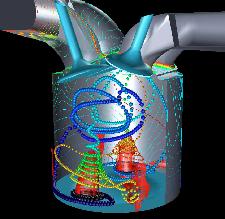Questions to Ask Yourself About Computational Engineering
Computational engineering is a field that combines mathematics and science. It deals with developing and applying mathematical models to solve complex physical problems in engineering, design, and natural phenomena. Computational engineering uses the power of computer science to solve complex problems. Here are some questions to ask yourself when considering computational engineering. The first question is “How hard is it?”
What is computational engineering?
Computational science and engineering is an emerging field of study. It is a branch of mathematics that deals with the creation and application of computational models and simulations, often in conjunction with high-performance computing (HPC). Computational science and engineering is used to solve problems related to engineering, design, natural phenomena, and other disciplines that require large amounts of data and analysis.
Computational engineering is an area of mathematics that combines various disciplines to produce practical solutions for problems. It requires highly technical skills, and individuals with a background in mathematics or computer science can enter this field. Computational engineers must use a combination of advanced mathematical and computer science techniques, as well as critical thinking.
The field is gaining popularity among students of computer science, since it requires skills that are highly sought-after in the modern world. It’s also a great career choice, as graduates have plenty of options in the job market.
Is computational engineering hard?
Computational engineering is a relatively new field that combines math, engineering, and computer science. In order to become a computational engineer, you must excel at all of these areas. It is a challenging career choice, but one that is rewarding and worth exploring if you love the challenge.
Computational engineering requires close attention to minute details. A computer program must follow strict rules and be written in a specific order. It must also be repetitive. This is because, unlike humans, computers are exceedingly stupid, so they need to be taught how to do things in the proper order. In other words, computational engineering requires an attention to detail that cannot be learned overnight.
Computational engineers use computer programs to model complex systems. This requires an in-depth understanding of complex systems, as well as an ability to communicate complicated ideas to others. Computational engineers work closely with other professionals, and they must have strong analytical skills.
What is computational engineering in IIT?
If you’re a math and science nerd who is interested in applying computer science to solve complex problems, you might be interested in pursuing a degree in computational engineering. Though this field is still relatively new and the job outlook for computational engineers is not as promising as in some other fields, it is a rewarding path for students who want to be on the cutting edge of discoveries in the field.
Students studying this field acquire a comprehensive knowledge of numerical techniques and mathematical models. They use their knowledge to develop algorithms and computer simulations to solve engineering design problems. Students may choose electives in topics such as biomedical engineering, structural design, process engineering, and chip design. Computational engineers also have the opportunity to work on interdisciplinary projects and solve real world problems.
The International Masters programme in Computational Engineering helps students develop software for Engineering analysis and design. The curriculum of this program includes courses in Numerical analysis, Finite element method, Continuum Mechanics, Bioinformatics, and modelling and simulation. It is a four-year program designed to train students with the skills that are in high demand in bioinformatics. Students who complete the program are expected to be competitive in the field.
Which engineering is best for IIT?
There are several branches in computational engineering at IIT. These branches cover mathematics, statistics, decision making, and machine vision. Students who want to specialize in one of these areas will have to meet the admission requirements for that particular IIT. Students who are passionate about solving challenging problems should consider this branch as a possible career option.
Computational engineers apply mathematical models and computer simulations to real-world problems. These engineers also develop algorithms for optimizing systems and other complex processes. Their education will include both theoretical and applied computer science. The study of algorithms and programming languages is central to computational engineering. Computer engineers can pursue careers in many fields, such as artificial intelligence, chip design, and computer aids for the visually handicapped.
Those interested in computational science and engineering should look into the IIT-B CSE department. The department offers BTech and MTech programmes in the field, as well as dual degree and PhD options. There are also honors programs in computational science and engineering.
Which is the No 1 IIT in world?
If you’re interested in studying computational engineering, then you might be wondering: which IIT is No 1 in the world? The list was published on April 6 by QS. According to the list, Stanford University is the No. 1 IIT in the world, and the University of Cambridge is No. 5. Tsinghua University and Peking University both entered the list, but are not quite there yet.
The rankings took several factors into consideration: number of papers published, number of citations per paper, inclusivity, diversity, governance & administration, international outlook, and more. IITs Bombay and Delhi were the only Indian institutes to be ranked in the top 100 globally.
MIT is another top university with the highest number of graduates per year. Founded in 1861, MIT has played a critical role in the development of modern science and technology. The QS World Ranking 2021 lists MIT as the top engineering university in the world.
Which IIT get highest salary?
If you’re a student studying computational engineering, you might be wondering: Which IITs pay the highest salary? According to the Mettl study, graduates from IITs make an average annual salary of Rs11.1 lakh, compared to Rs4.7 lakh for entry-level engineers. This is partly because IITs’ top-notch faculty, infrastructure, and reputation have lured employers, and international companies, too, come to these campuses to recruit students.
Computer scientists earn higher salaries than any other branch of engineering. Many companies are looking for students with skills in machine learning, AI, and decision analysis. In addition to software engineering, students of computational engineering can also find jobs as machine learning engineers, data scientists, and decision analysts. According to the data provided by IIT Patna, students from this school have been recruited by 87 companies.
The placement season for final-year engineering students begins in December. During this time, students apply to various companies and select the one with the highest salary. This depends on the type of work they’ll be doing and the amount of money they’ll be paid. This is why it’s important to have strong skills and knowledge when applying for a high-paying job.
Which engineering has highest salary?
While salaries for various engineering specialties differ, the average engineer salary is significantly higher than other professions. This is because engineer jobs require a large amount of technical skill. Furthermore, as industries become increasingly dependent on technology, there is a high demand for these engineers. If you want to become a part of this high-paying field, you can choose to pursue a bachelor’s degree in engineering.
As the nation’s infrastructure is aging, there is a need for highly-skilled engineers. There are also a number of green environmental practices emerging around the world, putting demand for these professionals even higher. First-time hires in this field can expect to make $57,500 on average, but they can easily earn more than $90,000 at the mid-career stage.
Another field with a high salary is aerospace engineering. These engineers are trained in a variety of disciplines, and their salary can reach up to $185,000 for the top ten percent of earners. However, job growth in this field is anticipated to be small because the industry is moving towards greater efficiency and capability.
Which engineering is hardest?
The first question many students ask is, “Which engineering is hardest?” The answer depends on the type of engineering you want to pursue. Some majors require more study time and require analytical skills, while others are more practical. Engineering majors usually earn higher salaries than other majors. While all engineering courses are challenging, the workload is typically higher than in other majors. For example, students in an engineering program do 50% more work than in pre-med or physics. Similarly, students in a philosophy degree have the highest IQ, which is about a level with physicists. Alternatively, those interested in computer science can expect to earn around $114,600 a year.
While the average GPA for medical school applicants at Penn was 3.60, that number is much higher nationwide. However, this doesn’t mean that engineering students with lower GPAs shouldn’t try to get into medical school. After all, an engineering degree does provide valuable transferable skills, such as critical thinking and work ethics. As a result, engineers are in the best position to transition to medical school.



